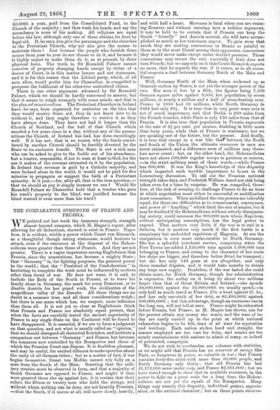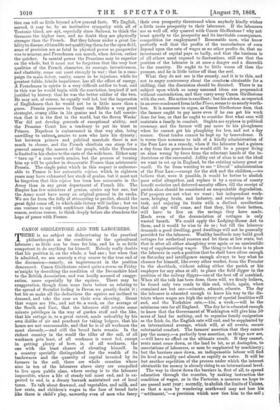THE COMPARATIVE STRENGTH OF FRANCE AND PRUSSIA.
WE pointed out last week the immense strength, strength almost beyond compare, which M. Magne's report, after allowing for all deductions, showed to exist in France. Napo- leon, it is evident, wields a power which Count von Bismarck, as a thoughtful though daring statesman, would hesitate to attack, even if the resources at the disposal of the Hohen- zollerns were greater than those of France. And they are not greater. There is a vague impression among Englishmen that Prussia, since the annexations, has become a mighty State ; that " Germany " is, for fighting purposes, the greatest power in the world ; that the "President of the Confederation" in hesitating to complete the work must be influenced by motives other than dread of war. He does not want, it is said, to include the Reds of the South in Prussia, or to leave his family alone in Germany, the mark for every Democrat, or to disable Austria for her grand work, the civilization of the magnificent valley of the Danube. All these things are no doubt in a measure true, and all these considerations weigh ; but there is one more which has, we suspect, more influence than them all. It is not yet so clear as Englishmen think that Prussia and France are absolutely equal powers, that when the facts are carefully tested the ancient superiority of France to any single State on the Continent will be found to have disappeared. It is essential, if we are to form a judgment on that question, and not what is usually called an "opinion," that we should disregard all rhetorical flourishes, and institute a comparison not between "Germany" and France, but between the resources now controlled by the Bonapartes and those of which the Prussian Court can dispose. It is doubtless pleasant, and may be useful, for excited riflemen to make speeches about the unity of all German tribes ; but as a matter of fact, if war begins to-morrow, Count von Moltke cannot rely fully on a man from the South of the Main. Granting that the mili- tary treaties must be observed in form, and that a majority of South Germans are opposed to France, and might if time were granted them rise up against her, it is certain that their rulers, the fifteen or twenty men who hold the strings, and without whom nothing can be done, are not heartily Prussian, —that the South, if it moves at all, will move slowly, heavily,
and with half a heart. Slowness is fatal when you are resist- ing Zouaves, and without entering into a tedious argument, it may be held to be certain that if Prussia can keep the South " friendly " and Austria neutral, she will have accom- plished as much as her statesmen expect. To gain even that much they are making concessions to Russia as painful to them as to the most liberal among their opponents, concessions they would never make except under decided pressure. Those concessions may secure the end, especially if Italy does not turn French; but we mayrely on it that Ccunt Bismarck expects no more, that he regards the war, if it comes, as in all essen- tial respects a duel between Germany North of the Main and France.
Well, Germany North of the Main, when reckoned up as Generals reckon up States, is not yet the stronger power of the two. Her area is less by a fifth, the figures being 7,538 German square miles against 9,850, her population by seven millions, or nearly a million and a half of arms-bearing men. France in 1866 had 38 millions, while North Germany in 1864 had only 29}. It is true that in very great wars area is not of much importance, and that Berlin is 260 miles from the French frontier, while Paris is only 130 miles from that of Prussia. It is also true that population in Prussia augments at the rate of 2f per cent. per annum, doubling in little more than forty years, while that of France is stationary, but we are speaking not of the future, but the present. And finally, it is true that except in a war like that between the North and South of the Union, the ultimate resources in men are never exhausted, and a difference even of millions may there- fore never count ; but, on the other hand, the Hohenzollerna have not above 300,000 regular troops in garrison or reserve, —in the strict military sense of those words,—while France has 600,000. It was the King's knowledge of this disparity which imparted such terrible importance to hours in the Luxemburg discussion. To call out the Prussian national strength takes days, and Frederick William dared not risk being taken even for a time by surprise. He was compelled, there- fore, at the risk of seeming to challenge France to fix an hour at which negotiation must either be successful or mobilization must commence. When mobilized the two powers are tolerably equal, for there are difficulties as to commissariat, conveyance, and power of " handling " which limit the size of armies, but it maybe doubted if the Hohenzollerns, without utterly disorganiz- ing society, could summon the 900,000 men whom Napoleon, without anticipating conscriptions, has the legal power to expend. That matters very little if the war is to end in a Sadowa, but it matters very much if the first battle is a sanguinary but undecided repetition of Magenta. At sea the comparison is even more unfavourable to North Germany. She has a splendid merchant service, comprising when the Free Towns are added 1,150,000 tons against 1,008,000 tons belonging to France, and owing to the character of her trade her ships are bigger, and therefore better fitted for transport ; but she has only 549 guns at sea altogether, and only three ironclad frigates, and it would take months to obtain any large new supply. Doubtless, if the war lasted she could obtain more, for North Germany, though her administration is expensive, the outlay on it being by about two millions
larger than that of Great Britain and Ireland,—she spends 38,000,000/. against the 36,000,000/. we usually spend,—ia only half as much taxed as France, 27s. a head against 2/. 5s., and has only one-sixth of her debt, or 82,400,000/. against 500,000,0001.; but this advantage, though an enormous one in the long run, will not tell at once. France might be exhausted before Prussia, but France, as M. Magna has shown, can for the present obtain any money she wants, and the wars of to- day are rarely carried up to the point at which national exhaustion begins to be felt, least of all wars for reputation and territory. Each nation strikes hard and straight, the masses employed are too vast for delay, and armies are too nearly conterminous with nations to admit of many, or indeed of protracted, campaigns. We do not wish to overburden our columns with statistics, or we might add that Prussia has no reservoir of energy like Paris, so dangerous in peace, so valuable in war ; that France contains forty-five cities with more than 30,000 people, and North Germany only thirty ; that old Prussia has but 41,173,000 acres under crop, and France 82,661,000; but we have stated enough to show that in available resources, in the power to fight on a great scale for a long time, the Hohen-
zollerns are not yet the equals of the Bonapartes. Many things may remedy this disparity, individual genius, organiz- ation, or the national character ; but on these points observa- tion can tell us little beyond a few general facts. We English, moved, it may be, by an instinctive sympathy with all of Teutonic blood, are apt, especially since Sadowa, to think the Germans the higher race, and no doubt they are physically stronger than the French. But they labour under a great lia- bility to disease, citizen life not qualifying them for the open field, arms of precision are as fatal to physical power as gunpowder was to armour, and Frenchmen can march, when driven, rather the quicker. In mental power the Prussians may be superior on the whole, but it must not be forgotten that the very best qualities of the French character, its courage, inventiveness, and elasticity, come out most strongly in war ; that in a cam- paign its main defect, vanity, ceases to be injurious, while its greatest foible, febrile impatience, has all the effect of energy. A Frenchman in spirits is a very difficult soldier to beat, and in this war he would begin with the conviction, inspired if not justified by history, that he was the better soldier of the two. He may not, of course, be equally well led, but the impression of Englishmen that he would not be is little more than a guess. Prussia possesses in Count von Moltke a very great strategist, strong alike in his genius and in the full convic- tion that it is the first in the world, but the Seven Weeks' War did not develop generals of exceptional ability, and the Prussian Court has a tendency to put its trust in Princes. Napoleon is embarrassed in that way also, being unwilling to entrustiormies to men who hate his dynasty ; but between princes and political marshals there is not much to choose, and the French chieftain can stoop for a general among the masses of the people, while the Prussian is limited in his choice to the caste of the well-born. Either may "turn up" a man worth armies, but the process of turning him up will be quicker in democratic France than aristocratic Prussia. The single point which in this respect is unfavour- able to France is her autocratic regime, which in eighteen years may have exhausted her stock of genius, but it must not be forgotten that this re'llime has been less autocratic in the Army than in any great department of French life. The Empire has few ministers of genius, cynics say but one, but the Army must have many an original general in its ranks. We are far from the folly of attempting to predict, should the great fight come off, to which side victory will incline ; but we can venture to say with confidence that North Germany has reason, serious reason, to think deeply before she abandons the hope of peace with France.































 Previous page
Previous page